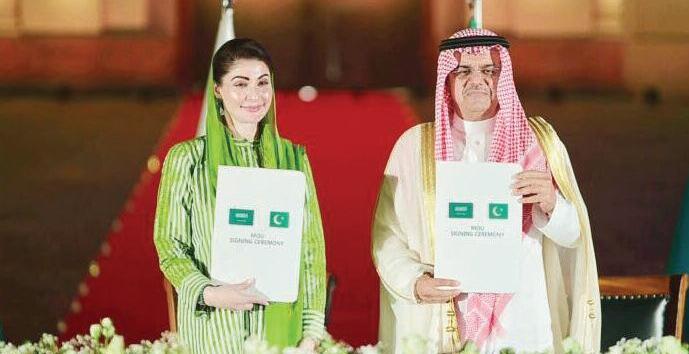

PAKISTAN ARMY THWARTS ‘ATTEMPTED INFILTRATION,’ RESPONDS STRONGLY TO UNPROVOKED AFGHAN FIRING
g UNPROVOKED FIRING REPORTED AT MULTIPLE BORDER
g SECURITY SOURCES SAY ATTACK AIMED AT AIDING KHAWARIJ INFILTRATION INTO PAKISTAN g
SECTORS FROM ANGOOR ADDA, BAJAUR, KURRAM, DIR, CHITRAL, TO BARAMCHA AND KHAR LACHI
g INTERIOR MINISTER VOWS FIRM RESPONSE, SAYS ‘AFGHANISTAN BEING ANSWERED WITH STONES FOR STONES ’

Tafter gunfire that according to officials, was aimed at facilitating the illegal entry of Khawarij (the state term for the
heavy enemy casualties; they said dozens of Afghan fighters and foreign militants were killed and that Taliban fighters abandoned posts in panic The Pakistan Army immediately gave a strong and effective response and targeted several Afghan posts ” one security source told reporters “Bodies were left behind as the militants fled; posts were deserted
Pakistan slams Afghan FM’s India remarks, warns ‘deflec tion won’t erase Kabul’s anti-terror duty ’
ISLAMABAD S
Pakistan on Saturday strongly rebuked Afghan Acting Foreign Minister Amir Khan Muttaqi for his remarks made during a visit to India, warning that “deflecting responsibility for crossborder terrorism cannot absolve the Afghan interim government of its obligations toward regional peace and stability according to a Foreign Office statement The sharp response came after Muttaqi, while addressing a press conference in New Delhi following a deadly explosion in Kabul on Thursday indirectly blamed Pakistan and claimed there was no terrorist group left in Afghanistan He said countries should resolve their internal issues themselves, adding, “Since the last eight months there has not been even
a small incident in Afghanistan In four years, no one has been harmed from Afghanistan’s soil This is the best proof we have presented ” The FO statement said Pakistan’s strong reservations over elements of the India-Afghanistan joint statement were formally conveyed to the Afghan ambassador in Islamabad by the Additional Foreign Secretary (West Asia & Afghanistan) Rejecting Muttaqi’s assertion that terrorism was Pakistan s internal problem the FO said Islamabad had repeatedly shared details with Kabul regarding the presence of Fitna al-Khawarij and Fitna al-Hindustan terms used for militants of the banned Tehreek-i-Taliban Pakistan (TTP) and India-backed Baloch insurgent groups operating from Afghan soil with support from elements within Afghanistan
The exchanges, the sources noted, were still ongoing late Saturday Troops along the western frontier were reported to be on high alert as retaliatory operations continued in some sectors The cross-border firing coincided with a diplomatically sensitive moment: Afghanistan’s acting foreign minister was on an official visit to India, a development Islamabad flagged as concerning Security officials said the timing and coordination of the strikes together with reported militant movement along the border, raised serious questions about the role of Afghan forces in facilitating cross-border militancy Interior Minister Mohsin Naqvi strongly condemned the “unprovoked firing” on civilian-populated areas inside Pakistan and termed the attacks a breach of international law The firing on civilian populations is an open breach of international law he said commending the armed forces for an immediate and effective response
Defence Czar urges Kabul to act against terrorists as relations reach new low
SIALKOT
S ta f f R e p o R t
Defence Minister Khawaja Asif has cautioned that Pakistan s relations with Afghanistan are deteriorating, warning that the prevailing environment could further strain bilateral ties a situation Islamabad does not desire Pakistan wants relations of respect dignity and brotherhood, just like good neighbors, and we expect Afghanistan to cooperate in addressing cross-border terrorism ” the minister said in an interview with a private TV channel on Saturday
Asif noted that relations between the two countries had never been ideal, alleging that terrorism was being exported from Afghan soil into Pakistan He reiterated that Islamabad s expectations of mutual respect and cooperation were essential for regional peace
Tensions between Islamabad and Kabul have escalated in recent months amid the interim Afghan government’s reluctance to act against terrorist groups operating from its territory Pakistan has seen a surge in cross-border attacks since the Taliban s return to power in 2021, particularly in Khyber Pakhtunkhwa and Balochistan
The two neighbours share a
deficiency it will be removed The party will fully support Sohail Afridi The sequence of events unfolded late last night after high-level consultations within PTI’s central leadership On Imran Khan’s explicit instructions Gandapur tendered his resignation as Chief Minister paving the way for Afridi s nomination as his successor However, Governor Faisal Karim Kundi threw a wrench into the process by stating that he had not formally received the resignation
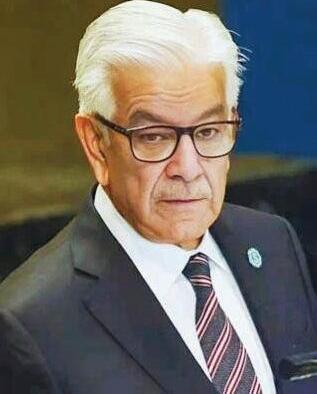
porous 2 500-kilometer border with multiple crossings crucial for trade and people-to-people ties
However, terrorism remains a persistent challenge, with Pakistan repeatedly urging Kabul to prevent its soil from being used by groups such as the TTP Asif said residents of areas harbouring terrorists were often aware of their presence adding that silence in such cases amounts to partial consent He vowed that patriotic citizens would face no harm, while terrorists and their facilitators would be dealt with firmly
Highlighting Pakistan s decades-long support for Afghans, the minister noted that over 554,000 undocumented Afghans had been repatriated since April
2025 under the Illegal Foreigners Repatriation Plan, including about 145,000 in August
Asif also alleged that masterminds of terrorism were based in Afghanistan and receiving support from India whose recent statements he warned indicated the possibility of another misadventure Pakistan, he asserted, would respond “more forcefully than before ” A day earlier, DG ISPR Lt Gen Ahmed Sharif Chaudhry said Pakistan had engaged Afghanistan through multiple diplomatic channels including the US Saudi Arabia, Qatar, Turkey, and the UAE but cautioned that space given to non-state actors in Afghanistan is dangerous for both countries He urged Kabul to seal the border and stop its territory from being used for attacks on Pakistan, adding that India was exploiting Afghan soil for proxy operations and that much of the American weaponry left after the US withdrawal had fallen into the hands of terrorist groups A recent United Nations Security Council (UNSC) report by the Analytical Support and Sanctions Monitoring Team also confirmed Islamabad’s concerns revealing operational financial and logistical links between Kabul and the TTP
document effectively stalling the handover Undeterred, PTI escalated the matter by requisitioning an emergency session of the Khyber Pakhtunkhwa Assembly, scheduled for 3 p m on Saturday Sources within the party indicated that the session was primarily to focus on tabling and passing a no-confidence motion against Gandapur ensuring a smooth transition to Afridi The resignation was not accepted, so we’re removing him through the no-confidence route ” a PTI spokesperson confirmed adding that the move aligns with the party’s strategy to maintain governance continuity amid mounting political pressures However, Khyber Pakhtunkhwa Governor Faisal Karim Kundi later in the day admitted that the resignation of PTI’s Ali Amin Gandapur has been “duly received and acknowledged” by the Governor ’s House Today at 2:30 pm the handwritten resignation advice of the CM Khyber Pakhtunkhwa was duly received and acknowledged by Governor House, Kundi posted on X
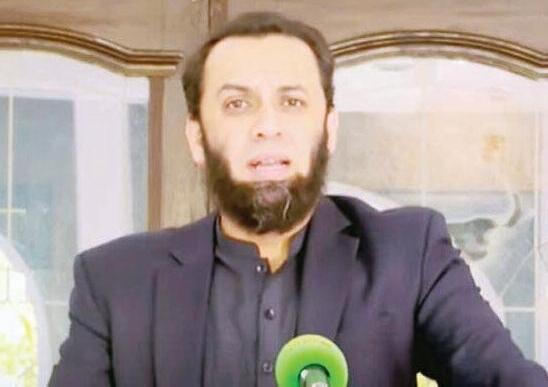
memories of the APS Peshawar attack and the recent Khuzdar bus attack, saying the blood of those victims remains an eternal reminder of national resolve He said he had personally met the bereaved families in Khuzdar and Quetta “One father who lost three sons told me with courage and faith My

CITIES’ ECONOMY GRINDS TO A HALT AS PROTESTS TRIGGER WIDESPREAD DISRUPTION
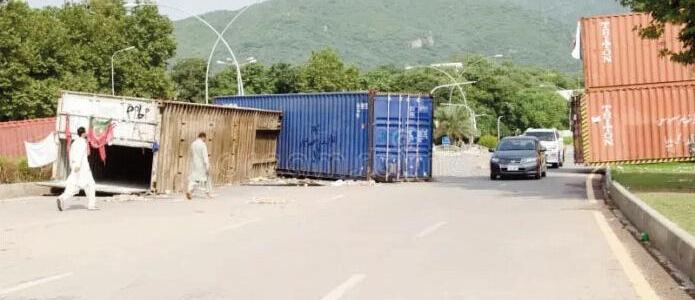
Pakistan registers over 600 firms with GACC, boosting trade access to China
PR OFIT s ta f f r e o r t
Over 600 Pakistani enterprises have successfully registered with the General Administration of Customs of China (GACC) marking a significant step in expanding Pakistan’s trade with China
focused on advancing AI in the country The Prime Minister highlighted that promoting information technology and AI is a priority for the government with the goal of harnessing emerging technologies to drive economic growth and innovation Prime Minister Shehbaz emphasised that the digital economy s effectiveness will be enhanced through AI, with a focus on the responsible and secure use of artificial intelligence as a top priority During the meeting he also stressed the need for data protection and sovereignty while integrating AI into national systems The Prime Minister directed the formation of a steering committee to facilitate the implementation of AI initiatives, reaffirming the government s commitment to executing the national AI policy effectively
This milestone covers a broad range of sectors, including agriculture, industry, and digital trade, with the registrations enabling direct exports to China The registrations include 25 mango hot water treatment plants 21 citrus cold treatment facilities 103 rice exporters 15 rapeseed meal companies 106 cherry exporters, 175 seafood exporters, 185 sesame seed processors, 10 fish meal producers, and seven defatted bone enterprises
Several new product categories including onions donkey hides and dairy products are under review for export clearance by Chinese authorities The Commercial Mission of Pakistan in Beijing played a key role in facilitating these registrations by connecting exporters with Chinese
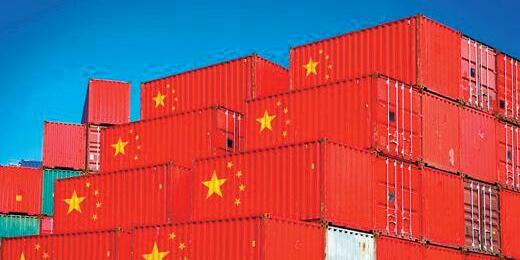
commerce bureaus and guiding them through GACC s quality and traceability standards
In addition to traditional exports, over 10 Pakistani companies have entered China s e-commerce market, registering on platforms such as Douyin JD com and Tmall Products like pink Himalayan salt pine nuts handmade carpets rice and cultural handicrafts are now available to millions of Chinese consumers The Mission processes trade and investment inquiries regularly and collaborates with Pakistan’s Trade Development Authority (TDAP) Board of Investment (BOI) and the Chinese Embassy

PSQCA APPROVES ‘T YPE APPROVAL SCHEME’ FOR VEHICLES TO BE TESTED IN FOREIGN L ABORATORIES
Dr Tariq Fazal Chaudhr
Attock, Jhelum, Narowal, Chiniot, Kasur, Khushab, Toba Tek Singh, Okara, Khanewal, Lodhran, Muzaffargarh, Hafizabad Jhang Pakpattan Rajanpur Sheikhupura and Vehari
However, PRAL’s figures were $16 5 billion lower t
ment officials said part of the difference stems from
goods while freight and insurance are treated separately but the magnitude of the gap suggests other causes The International Monetary Fund (IMF) has also asked Pakistan to publicly disclose and explain these discrep-




Ceasefire in Gaza
After more than t wo years, the guns fall silent
THE fighting in Gaza came to an end on Friday, just over two years of the original Hamas attack on 7 October 2023 started it Gazans had their fingers crossed, for this was not the first time they had seen a ceasefire A ceasefire had been reached in January, which had led to eight rounds of prisoner-hostage exchanges, but broke down in March This time around, the Trump 20-point peace plan, which formed the basis of the ceasefire, includes the provision for a swift prisoner-hostage exchange, to be accomplished in 72 hours Also, Israeli forces will leave positions The holding of the ceasefire is the main imponderable, and essential to any progress on the peace plan, which has settled many of the issues which were to be negotiated last time, such as the reconstruction of Gaza Quite apart from any other issue the Transitional Council plan where the committee of Palestinian technocrats will run the Gaza Strip under the supervision of former British PM Tony Blair, has run into trouble, with objections coming not just from Hamas but other Palestinians
In an indirect manner, that reflects the problem with this ceasefire Mr Blair ’s neutrality is suspect because as PM he was pro-Israeli Going by that standard, no acceptable figure can be found because anyone acceptable to the Palestinians would not be acceptable for the Israelis Even now the basic problem has been sidestepped Palestinians are determined not to accept Israel because it deprives them of a homeland of their own Israelis remain committed to the Zionist project because they do not see any alternative to building their homeland on top of another people’s Western governments remain committed to supporting Israel but their peoples have been obliged by the present episode to realize that Israel is an artificial entity artificially supported
Perhaps the most immediate problem now that the firing has stopped and the Israeli military has begun withdrawing is feeding the Gazans Apart from massacres by guns and bombs, the Israeli blockade seemed designed to starve the Gazan population, and the number of deaths by starvation was escalating The UN coordinator of Emergency Relief has said there is a plan to provide relief That must be prioritized The ceasefire is the result of pressure on Israel by erstwhile supporters, in turn pressurized by populations horrified by what Israel was doing with the support of the West

Dedicated to the legac y of late Hameed Nizami Arif Nizami (Late) Founding Editor
M A Niazi Editor Pakistan Today Babar Nizami Editor Profit
Csyed ali Nawaz GilaNi
HINA celebrated its 76th founding national anniversary with remarkable pomp and ceremony projecting an image of unity and strength under the leadership of President Xi Jinping More than just a commemoration of its national journey, the event became a statement of political, military, and economic confidence directed at the global audience It reaffirmed China s image as a symbol of international peace and prosperity The celebrations were not confined to parades or festivities They took place against the backdrop of shifting global dynamics, reaffirming Beijing's determination to consolidate its position as a leading force in world affairs At home the ceremonies showcased China's resilience and achievements Abroad through forums such as the Shanghai Cooperation Organisation Summit China underlined its intent to promote multilateralism, balanced development, and inclusive growth President Xi s introduction of the Global Geopolitical Initiatives (GGI), an expanded vision building on the Belt and Road Initiative (BRI) and related frameworks reflects China's aspiration to craft a new world order based on cooperation over confrontation and prosperity over inequality From Adversity to Global Power: The 80th anniversary was also a moment of reflection on China's transformation over the last eight decades Emerging from colonialism, wars, and widespread poverty, the country has risen to become the world s secondlargest economy and a key player in global politics
The festivities highlighted essential elements of China s national identity: decisive leadership unity of purpose, and the pursuit of ambitious development goals The display of next-generation defense systems was intended as much to signal deterrence and technological progress as to demonstrate military superiority Yet the central message was more subtle Through its leadership s speeches and symbolism China emphasized that it does not seek domination but wishes to share its prosperity as a responsible global power President Xi's address focused on national rejuvenation and China's readiness to shoulder a larger role in safeguarding peace and advancing global development The SCO and China's Regional Role: Running parallel to the anniversary the SCO Summit reaffirmed China s active role in regional and
international cooperation What began as a modest security platform has evolved into a comprehensive regional bloc addressing security, economics, and cultural exchange AT THE SUMMIT, CHINA EMPHASIZED THREE CENTRAL THEMES: Security cooperation against terrorism extremism and separatism Economic integration through improved connectivity and trade Cross-cultural exchange to strengthen mutual trust among member states By encouraging dialogue and common solutions, China positioned itself as both a mediator and facilitator of peaceful development The SCO's growing membership and partnerships reflect its expanding relevance and China s ability to anchor regional cooperation Beyond the Region: Multipolarity and Global Initiatives: China views the SCO as part of its broader global strategy the pursuit of multipolarity, where decision-making is decentralized and not monopolized by a select few powers The BRI has already built extensive networks of roads railways ports and pipelines across Asia Africa Europe and Latin America boosting trade and interdependence The newly proposed Global Geopolitical Initiative takes this vision further While the BRI concentrated on physical infrastructure, the GGI broadens the scope to include cultural, digital, strategic, and environmental cooperation
The GGI is closely aligned with other frameworks such as the Global Development Initiative (GDI) and the Global Security Initiative (GSI) creating a layered vision of governance rooted in inclusivity, fairness, and sustainability Together, these initiatives represent China's ambition to reshape globalization itself moving it from a competition-driven model toward one based on cooperation and shared prosperity Shared Prosperity as a Guiding Principle: At the heart

message is consistent: prosperity must be shared, and peace maintained through collaboration, not rivalry In this sense, China does not present itself as an isolated power but as a partner ready to work with others offering not only the blessings of its own development but also a model of collective progress for the century ahead
C h a l l e n g e s t o 2 6 t h A m e n d m e n t


WHEN during the hearing of petitions challenging validity of 26th Amendment on Wednesday Hamid Khan Advocate stressed for formation of full bench of Supreme Court under Article 187 Mr Justice Aminuddin Khan who heads the constitution bench remarked that they were relying on the existing constitution until a fresh amendment was made, adding that if they forget Article 191A then the Supreme Court would cease to exist today What Mr Justice Aminuddin said simply means that the courts are bound to dispense justice according to the constitution and the amendments made in it by the parliament Article 187 under which Hamid Khan asked for formation of full bench of the SC is actually about the powers of the court to issue directions orders or decrees as may be necessary for doing complete justice any case or matter pending before it which after the 26th Amendment under which the constitutional bench is now hearing the petitions has been formed, no more remains relevant in case of constitutional petitions Justice Aminuddin, by acknowledging that the Court has to go by the existing constitution (including 26th Amendment) has actually established the fact that Parliament which represents the will of the people is the mother of all state institutions and is empowered to amend the constitution like it has done in the case of 26th Amendment The constitution itself em-
powers the Parliament to amend the constitution as and when required making it unequivocally clear that the amendment thus made could not be challenged in any court of law Article 239(5) and 239(6) in this regard say “No amendment of the Constitution shall be called in question in any court on any ground whatsoever For the removal of doubt it is hereby declared that there is no limitation whatsoever on the power of the Majlis-e-Shoora (Parliament) to amend any of the provisions of the Constitution I think in the presence of such a categorical assertion by the constitution there was no justification for even accepting the petitions challenging the 26th Amendment by the Constitutional bench But the dilemma is that a bad unconstitutional precedent was set by the judges of the Supreme Court by entertaining petitions against 18th and 21st Amendments in 2015 That was the time when judicial activism was at its peak and judges were in an assertive mood Although the court dismissed petitions against the 18th Amendment by 14-3 majority and those against the 21st Amendment by 11-6 majority, 9 out of 14 judges maintained that parliament s powers to amend the Constitution were limited, and it was for the SC which was a guardian of the constitution to determine those limitations and if those limits were crossed to strike down the amendment They followed the concept of Basic Structure originally adopted by the Indian Supreme Court However Four judges including Chief Justice Nasir-ul-Mulk, Mr Justice Iqbal Hameedur Rehman, Mr Justice Asif Saeed Khosa, and Mr Justice Saqib Nisar rejected any limitations on Parliament s power to amend the Constitution rejecting the doctrine of basic structure They were right on the money to understand the spirit and thought behind absolute power of the Parliament to amend any provision of the constitution I will mention the views of only two judges in this regard Mr Justice Saqib Nisar stated “Matters of governance must be decided by the chosen representatives of the people and should not be left at the mercy of the collective wisdom of unelected judges , who are the least accountable branch in Pakistan The basic structure” doctrine, as adopted by the Supreme Court in India, is a vehicle for judicial aggran-
The judiciary being custodian of the constitution must strictly adhere to the constitution and should have straight away refused to entertain petitions challenging the 26th Amendment If Mr Justice Aminuddin and others hearing the petitions really believe in abiding by the existing constitution and being its custodians then they should throw them out instead of wasting time of the nation and resources on non-existing issues It may be the political agenda of the petitioners to challenge the amendment but not the judges Hearing the petitions against the amendment is itself a violation of the constitution
dizement of power at the expense of the elected representatives of the people Mr Justice Asif Saeed Khosa argued, “Even if the preamble and salient features of the Constitution expressed the will of a past generation then why should the Supreme Court hold future generations000 hostage to it? Surely if at some future stage the people of this country have a change of heart or mind then the will of the people will have its way and the aspirations of yore or yesteryears may not be able to shackle it” These minority views are jurisprudentially and constitutionally far more convincing than the majority s opinion regarding limitations on powers of the parliament
When the constitution says that the parliament can amend any provision of the constitution it also implies that the Parliament can also change its fundamental structure
Article 239(5) and (6) of the constitution which vest absolute and unchallengeable power in the Parliament to amend any provision of the constitution is very logical from the perspective of bringing changes in the constitution to deal with new challenges and emerging ground realities It is because of this rationale that every written constitution makes provision for amending the constitution by the parliament Accordingly so far 26 amendments have been made in the constitution of Pakistan
The Parliament is the creator of the Constitution which reflects the will of the people When this constitution was framed there was a general consensus that Pakistan needed a parliamentary system of government The Parliament also determined fundamental rights as well as the principle of trichotomy of powers As regards making amendments in the constitution, I will go with remarks of Justice Asif Saeed Khosa regarding the absolute power of Parliament to amend any clause or article of the constitution in conformity with the will of the people These articles hardly need any interpretation
So When the constitution categorically says that there is no limitation on the power of Parliament to amend any of its provisions and it cannot be challenged in any court of law on any ground the courts must uphold it by refraining from entertaining any petition against any amendment or condescending to give a different meaning to the relevant Article
The judiciary being custodian of the constitution must strictly adhere to the constitution and should have straight away refused to entertain petitions challenging the 26th Amendment If Mr Justice Aminuddin and others hearing the petitions really believe in abiding by the existing constitution and being its custodians then they should throw them out instead of wasting time of the nation and resources on non-existing issues It may be the political agenda of the petitioners to challenge the amendment but not the judges Hearing the petitions against the amendment is itself a violation of the constitution
Malik Muhammad Ashraf is an academic He can be contacted at: ashpak10@gmail com
Closing doors

The Silent Epidemic
Iof this misplaced blame regardless of the actual medical cause, while men are often excluded from investigation diagnosis or even responsibility The silence around male infertility is particularly striking Studies in Pakistan and internationally show that male factors account for about 40 to 50 percent of infertility cases, yet cultural norms dictate that a man’s virility is unquestionable As a result women undergo invasive tests harsh medications and even dangerous unregulated treatments while male partners frequently avoid even a basic semen analysis This gendered imbalance in how infertility is approached perpetuates a cycle of emotional abuse, marital breakdowns, and in extreme cases, domestic violence and abandonment The social pressure placed on women who cannot conceive is immense In many communities motherhood is seen not just as a role but as the sole measure of a woman s worth Infertility can lead to ostracization within families, denial of inheritance rights,
second marriages and in some cases divorce or desertion Stories abound of women being mocked by in-laws excluded from family rituals or denied basic respect within their homes The language used around infertility itself is often dehumanizing, with terms like “banjh” or “barren” reducing women to their reproductive status Such psychological abuse compounds the physical challenges of infertility leaving women vulnerable to depression anxiety and even suicidal ideation
In the absence of widespread access to affordable, regulated fertility care, a parallel and dangerous industry has thrived Quacks, unqualified hakeems and self-proclaimed fertility specialists profit from the desperation of couples who want children They market concoctions of herbs tonics or injections that are either placebos at best or harmful at worst, often laced with steroids or heavy metals that damage the liver and kidneys In urban centres the rise of flashy but unregulated fertility clinics offering procedures such as intrauterine insemination or IVF without proper licensing has created additional risks Patients pay exorbitant amounts without guarantees of ethical practices, proper laboratory standards, or honest counseling about success rates The business of infertility has become lucrative precisely because of the cultural silence around it
Couples often avoid public hospitals where confidentiality might be breached and instead turn to private operators who promise miracles The absence of strict government regulation allows these practices to flourish unchecked leaving vulnerable families financially drained and medically harmed
Reproductive abuse extends beyond
quackery into the way infertility is handled even in formal medical settings Many women are subjected to repeated hormone treatments without adequate monitoring exposing them to the risk of ovarian hyperstimulation syndrome Others are pushed toward expensive IVF cycles without being informed of the relatively modest success rates, particularly in older women or those with underlying health conditions
Ethical breaches such as misreporting embryo quality mishandling of gametes or even unauthorized use of donor sperm or eggs have been reported in various contexts highlighting the lack of accountability The lack of psychosocial support in fertility treatment further worsens outcomes, as patients are rarely counseled on coping strategies, marital communication or alternative life paths when treatment fails
Religious and cultural narratives also play a significant role in shaping how infertility is viewed and managed in Pakistan While Islam does not stigmatize infertility and allows for medical intervention within ethical boundaries, local cultural interpretations often distort this perspective Some families pressure women into visiting shrines undergoing spiritual rituals or consuming holy water as a solution while simultaneously resisting medical consultation
Others manipulate religious rhetoric to justify polygamy or second marriages under the pretext of ensuring offspring These distortions further entrench the gendered nature of infertility reinforcing the idea that a woman s failure to conceive is justification for her replacement
The economic cost of infertility is significant as well A single IVF cycle in Pakistan can cost between Rs 400,000 to Rs 600 000 an amount that is out of reach for most households where the average monthly income may not exceed Rs 50 000 With success rates often hovering around 30 to 40 percent per cycle, many couples either give up after financial exhaustion or continue borrowing money and selling assets in the hope of a child Meanwhile the money spent on unregulated hakeems



tion and support for US sanctions on the country is however not an advocate of peaceful transition Instead, she has openly advocated for regime change to be thrust upon her country by the foreign powers
policy platform is of the far-right persuasion and advocates for the total privatizat i o n
country s oil resources While US President Donald Trump had eyed the Nobel Peace Prize, suggesting he should win it over what he claims is a historic achievement of ending eight wars much of the pushback against the American
leader came due to his right-wing policies and aggressive foreign policy which included attacking Iran In addition to this the United States has now mobilized its navy and is threatening military intervention to unseat the current government in Caracas Nobel Peace Prize winner, Machado,
existential threat to Israel Maria Corina Machado has also appeared on Israeli television to advocate for the re-establishment of ties between Venezuela and Israel even vowing that under her leadership the Venezuelan Embassy would be moved to occupied Jerusalem She also put out a video thanking former US-backed Venezuelan opposition leader, Juan Guaido, for recognizing Israel’s Capital as occupied Jerusalem In 2020 Machado signed a cooperation agreement with Benjamin Netanyahu s Likud Party on political ideological and social issues as well as advancing on issues related to strategy, geopolitics and security Earlier this year, Machado participated alongside her Likud Party allies in the ultranationalist “Patriots for Europe” summit where both sold themselves as frontline warriors in the battle for Western civilization One of the most prominent slogans at
this right-wing conference was “Reconquista referencing European military efforts to expel Islamic influence which included the mass forced conversion of Muslims and Jews to Christianity, amidst the slaughter and displacement of civilians to achieve this goal Understanding that Machado is an ardent supporter of Israel’s genocide and stands with it in its implementation of Apartheid policies there has been an enormous backlash online against the Norwegian Nobel Committee, with some going as far as advocating for the abolishment of the peace prize altogether
The Nobel Prize appears to be suffering a legitimacy problem in the wake of this backlash as many question how a peace prize could be presented to a supporter of regime change, economic sanctions and ally herself with a regime that is committing genocide
Robert Inlakesh is a journalist writer and documentary filmmaker He focuses on the Middle East specializing in
How Netanyahu's war on Islam fuels antisemitism in Europe


government is rewarding him for it The irony is almost bib-
lical: a minister for combating antisemitism embracing the very forces that stoked it Britain’s Jewish community has reacted with alarm The Board of Deputies, one of Israel’s staunchest supporters called Robinson a thug who represents the very worst of Britain In a remarkable statement the board accused Chikli of ignoring the overwhelming majority of British Jews who utterly and consistently reject Robinson and everything he stands for” The Jewish Leadership Council added its condemnation warning that such alliances undermine efforts to combat extremism and foster community cohesion MORAL RUPTURE This is not a diplomatic misstep It is a moral rupture - a moment when Israel’s leadership chose to stand with those whom Jewish communities have long warned the world about Israel s embrace of Robinson is no isolated act; it is a continuation of Prime Minister Benjamin Netanyahu s worldview - one that frames Islam as the civilisational enemy of the West By aligning with far-right figures, Israel casts itself as the vanguard of “western civilisation”; the first line of defence against an imagined Muslim threat And the consequences are already visible Just weeks ago Robinson led an unprecedented racist march through central London A chilling investigation by YouTuber Niko Omilana captured participants calling for Muslims to be expelled or killed One woman proudly described carrying knives to use on a Black person A main speaker from the stage declared: Islam is our real enemy We have to get rid of Islam Netanyahu has long nurtured this logic
He has blamed Europe s criticisms of Israel on its large Muslim populations , claiming that “Europe was conquered by unchecked immigration” “Don’t feed the crocodile,” he warned European leaders “because it will come after you after it devours Israel In Netanyahu s story Islam is the crocodile But history tells another truth: the crocodile that devoured Jews in Europe wore a swastika, not a keffiyeh The beast Netanyahu now feeds is the same one that once hunted his people HEIRS OF FASCISM This courtship between Israel and the far right is no passing flirtation In 2018 the hardline pro-Israel Middle East Forum admitted to funding Robinson s legal defence and organising his “Free Tommy” rallies in London Its director, Gregg Roman, previously worked for Israel’s defence and foreign ministries Its president Daniel Pipes has been described by the Southern Poverty Law Centre as an anti-Muslim activist And this year, Israel went further still It lifted its diplomatic ban on three of Europe s most extreme far-right parties - France’s National Rally Spain’s Vox and the Sweden Democrats - and invited them to a conference in Jerusalem Jewish leaders across Europe boycotted the event in disgust Netanyahu s Israel, however, has chosen its friends: the heirs of fascism The cost is written in the rise of Islamophobia across Britain Nearly 40 percent of all religiously motivated hate crimes now target Muslims The Home Office last year recorded a 25 percent annual rise in religious hate crimes the highest count since records began more than a decade ago, while Tell
Mama logged more than 900 incidents between June and September of this year including attacks on mosques and Islamic centres At the same time, online abuse has exploded, fuelled by conspiracy theories spread by the same far-right influencers Israel now embraces This is not coincidence; it is contagion From Tel Aviv to London the same script repeats: they hate us, they threaten us, we must defend civilisation And that script is being mirrored by politicians in Britain itself In the wake of the recent Manchester syna-
bulletproof vest saying she no longer felt safe in the UK s streets The image went viral: an Israeli official donning body armour on British soil as her own government rolled out the red carpet for Robinson When Channel 4 s Cathy Newman pressed Haskel to condemn the invitation, she refused insisting that “people are
Oshaz Fatima

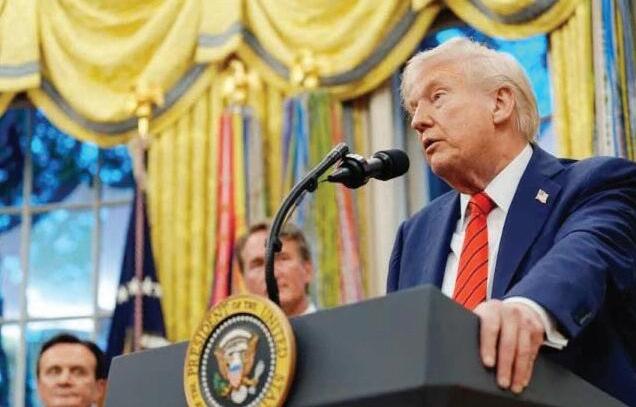








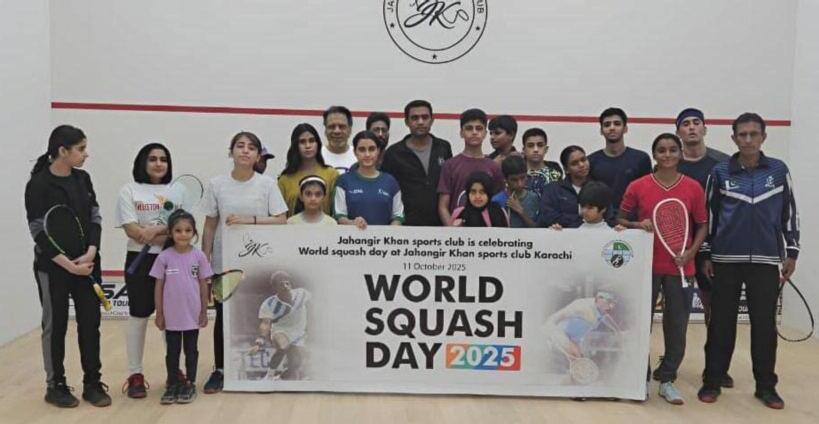
IBA Karachi Launches Book: State of Pakistan’s Economy 2025-2026
KARACHI
s ta f f
t
IBA’s Center for Business and Economic Research (CBER) unveiled its flagship report titled State of Pakistan s Economy 2025-26 - Missed Opportunity: Revisiting Pakistan s Choices authored by esteemed Faculty & Researchers from IBA s School of Economics & Social Sciences (SESS) The launch brought together researchers, economists, and students to discuss and reflect upon Pakistan s economic trajectory amid pressing challenges in governance and climate change The report offers an assessment of Pakistan s economic landscape highlighting missed opportunities and proposing actionable pathways for sustainable growth and includes chapters on the economic growth landscape, fiscal analysis, and socio-economic implications of the budget 2025-26 as well as trade business confidence the digital economy of Pakistan health social protection water scarcity and climate vulnerability The analysis highlights the interplay between economic policies, institutional governance, and climate vulnerabilities, underscoring the need for reforms across multiple sectors Renowned economists graced the book launch event including Dr Naeem Uz Zafar (SI) Chief Statistician Pakistan Bureau of Statistics and Dr Zehra Farooq Secretary Revenue Operations & Analysis, (FBR) The event was moderated by Dr Salman Khalid, Assistant Professor and Director, Economic Growth & Forecasting Lab Dr Naeem emphasized the prioritization of data-driven decision-making urging targeted and disaggregated measures to be undertaken in collaboration with public and private stakeholders to enhance economies of scale

PM ORDERS PROBE INTO ALLEGED MISUSE OF POWER, SAL ARY HIKE IN KEY REGUL ATORY BODIES
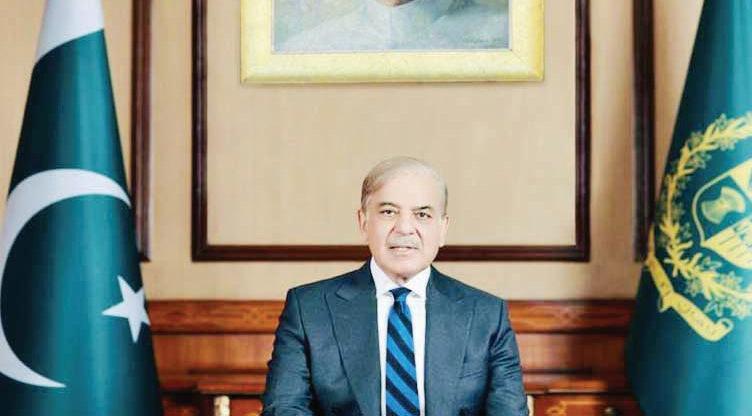
Punjab CM unveils ‘Zero Time to Start’ policy as Saudi investors eye Punjab projects
